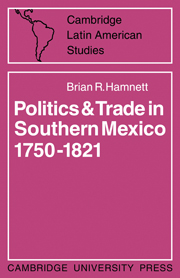Book contents
- Frontmatter
- Contents
- Acknowledgments
- Archival abbreviations
- Weights, measures, and currency
- Introduction
- 1 Oaxaca—environment and trade
- 2 The struggle for control of trade
- 3 The problem of reform, 1768–1786
- 4 Reform and reality—the crisis of the subdelegations in the 1790s
- 5 The Gálvez Plan under fire, 1786–1804
- 6 Finance, trade, and the merchants, 1789–1808
- 7 The political crisis of 1808–1821
- 8 Conclusion—Oaxaca within the context of Mexican politics
- Glossary of Personnel
- Appendices
- Sources and bibliography
- Maps
- Index
6 - Finance, trade, and the merchants, 1789–1808
Published online by Cambridge University Press: 04 August 2010
- Frontmatter
- Contents
- Acknowledgments
- Archival abbreviations
- Weights, measures, and currency
- Introduction
- 1 Oaxaca—environment and trade
- 2 The struggle for control of trade
- 3 The problem of reform, 1768–1786
- 4 Reform and reality—the crisis of the subdelegations in the 1790s
- 5 The Gálvez Plan under fire, 1786–1804
- 6 Finance, trade, and the merchants, 1789–1808
- 7 The political crisis of 1808–1821
- 8 Conclusion—Oaxaca within the context of Mexican politics
- Glossary of Personnel
- Appendices
- Sources and bibliography
- Maps
- Index
Summary
One of the principal objectives of the comercio libre legislation of 1789 had been to release Spain's trade with New Spain from the traditional control of the Consulados of Cádiz and Mexico. The generation of Gálvez believed such monopolies to be a hindrance to the expansion of trade. Into that context fall the efforts of the Metropolitan Government, Viceroy Revillagigedo, and Intendants Flon of Puebla and Mora of Oaxaca to secure the full prohibition of the repartimientos issued by the Alcaldes Mayores. For they had been financed by Mexico City merchants or their local associates. That system had, thus, enabled the Mexico merchants to maintain trade monopolies within several of the jurisdictions containing large indigenous elements.
The aim of the 1786 Ordinance had been to prevent the offering of avío by the Mexico merchants to the local justices. As this measure coincided with the issue of the 1789 comercio libre reform, the Spanish Government hoped that a new generation of smaller-scale, but more enterprising and efficient merchants would compete alongside, and eventually replace, the old merchants of the Consulado of Mexico.
We have seen how, realising the imminent end of the Alcaldías Mayores, several investors, in particular, Juan Baptista de Echarri, attempted to cut their losses by withdrawing their investments from the repartimiento. Nevertheless, the whole complexity of the discussion on the interpretation of Article 12 of the Ordinance of 1786 enabled elements of the old system to creep back during the middle of the 1790s in Oaxaca.
- Type
- Chapter
- Information
- Politics and Trade in Mexico 1750–1821 , pp. 95 - 120Publisher: Cambridge University PressPrint publication year: 1971



